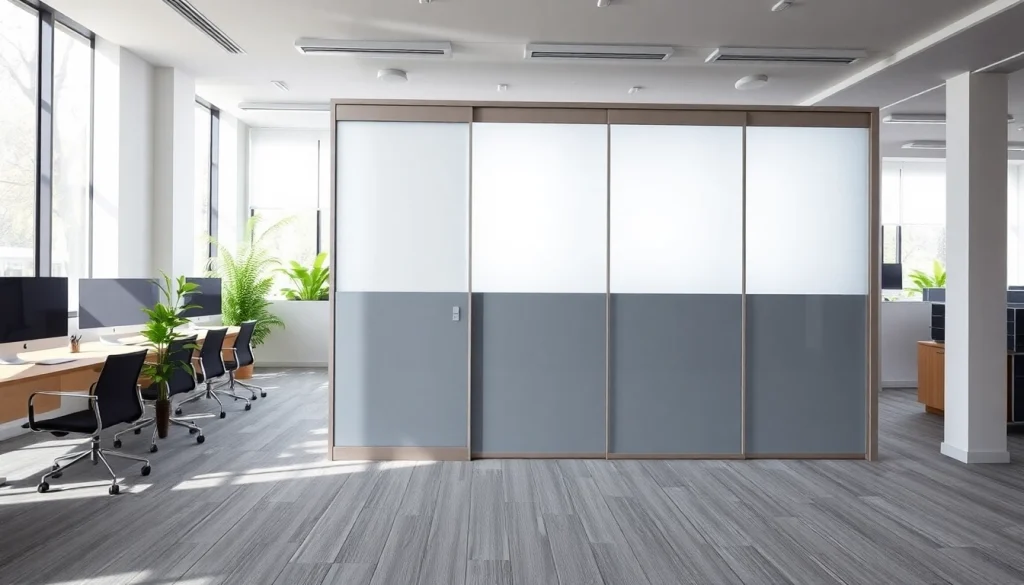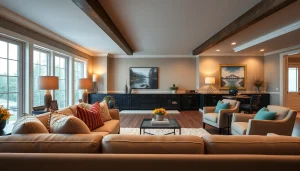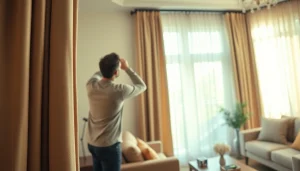Enhancing Spaces with Sliding Partition Walls: Benefits and Innovative Designs

Understanding Sliding Partition Walls
What is a Sliding Partition Wall?
A sliding partition wall is a versatile and modern solution designed to redefine space utilization in various environments, whether residential or commercial. Unlike traditional fixed walls, sliding partition walls offer the advantage of flexibility, allowing for dynamic room configurations that can be opened up or closed off as needed. These systems can range from simple curtain-like solutions to intricate, engineered wall panels that slide effortlessly on tracks.
Types of Sliding Partition Walls
Sliding partition walls come in several varieties, each catering to different needs and aesthetics:
- Panel Systems: These are often made of wood, glass, or composite materials and can slide open and closed, effectively dividing a room while maintaining aesthetic appeal.
- Metal and Glass Partitions: Ideal for modern office spaces, these partitions provide a sleek and sophisticated look while promoting transparency and collaboration.
- Acoustic Sliding Partition Walls: Designed for spaces requiring sound control, these walls are built with specialized materials to minimize noise transfer between rooms.
- Bi-Fold and Multi-Fold Options: These systems involve multiple panels that can fold together, ideal for maximizing the use of space in larger areas.
Benefits of Using Sliding Partition Walls
The growing popularity of sliding partition walls can be attributed to several compelling benefits:
- Space Optimization: These walls allow for flexible layouts, enabling users to create different configurations suited to various functions without permanent alterations.
- Enhanced Privacy: They provide an accessible way to partition areas while still preserving the overall layout of the space.
- Quick Installation: Most sliding partitions can be installed without extensive construction work, making them a lucrative option for renters or those looking to minimize renovation costs.
- Stylish Aesthetics: Available in various finishes and materials, sliding partition walls can enhance the visual appeal of any interior.
Applications of Sliding Partition Walls
Home Usage
In residential settings, sliding partition walls can create multifunctional spaces. For example, an open-plan living area can be partitioned into separate zones, such as a home office or a guest room, without the permanent commitment of building walls. The flexibility these partitions offer is particularly beneficial in smaller homes where space is at a premium.
Commercial Spaces
Businesses have embraced sliding partition walls as a way to adapt their environments to meet changing demands. In an office setting, for instance, these walls can facilitate collaborative spaces by allowing teams to easily divide or join rooms as their needs evolve. Additionally, restaurants and cafes use sliding partitions for private dining areas, enhancing the customer experience.
Events and Temporary Solutions
Sliding partition walls are also invaluable for events. They allow for quick modifications to the layout of event spaces, creating intimate areas or larger open spaces as needed. This versatility makes them an ideal choice for conference centers, wedding venues, and other event locations that require adaptability.
Choosing the Right Sliding Partition Wall
Materials and Design Considerations
When selecting a sliding partition wall, consider the intended use and environment. For high-traffic areas, durable materials such as metal and tempered glass might be ideal. Conversely, for a home setting, wood or decorative panels can provide warmth and style. Additionally, ensure that the design aligns with the overall aesthetic vision of the space.
Measuring and Installation Tips
Proper measurement is crucial for successful installation. Before purchasing a sliding partition wall, measure the height and width of the intended location, accounting for any obstructions. Use a spirit level to ensure that the track is perfectly horizontal. Also, consider consulting a professional if the installation involves complex elements such as electrical wiring or specific aesthetic adjustments.
Cost Factors and Budgeting
The cost of sliding partition walls can vary widely, depending on materials, size, and the complexity of installation. Standard panels may range from $40 to $100 per linear foot, while high-end systems using acoustic glass or custom designs can exceed $200 per foot. Budgeting should include not only the cost of materials but also potential installation fees and ongoing maintenance.
Maintenance and Care for Sliding Partition Walls
Regular Maintenance Practices
To ensure longevity and smooth operation, regular maintenance is vital. Lubricate tracks periodically with a silicone-based product to reduce friction and prevent wear. Inspect panels for scratches or damage, and clean surfaces with appropriate cleaners based on the material — glass cleaners for glass panels, wood polish for wooden ones, etc.
Troubleshooting Common Issues
Common issues such as sticking or misaligned panels can often be resolved with a few simple adjustments. If a panel is difficult to open or close, check the track for debris and clean as necessary. If misalignment occurs, carefully adjust the mounting hardware to realign the panels correctly.
Long-term Care Tips
Investing in good quality sliding partition walls can lead to long-term benefits. Choose options that offer warranties and consider professional inspections annually to assess wear and longevity. A proactive maintenance approach will not only enhance the usability of the partitions but also contribute to the overall aesthetic appeal of the space.
Future Trends in Sliding Partition Wall Designs
Eco-Friendly Materials
As sustainability continues to be a priority across industries, more manufacturers are beginning to offer sliding partition walls made from eco-friendly materials. Bamboo, reclaimed wood, and recycled metals are becoming popular choices, appealing to environmentally conscious consumers and businesses alike.
Technological Innovations
Technological advancements are influencing the design and function of sliding partition walls. Motorized options that can be controlled via smartphone apps or integrated into smart home systems provide enhanced convenience and modern appeal. Additionally, features such as integrated lighting or acoustic dampening technology are becoming more common in advanced partition systems.
Predictions for Room Flexibility Solutions
The push for more adaptive living and working environments is expected to amplify interest in sliding partition walls. As remote work and flexible office arrangements increase, demand for versatile solutions that promote collaboration while maintaining privacy will rise. Furthermore, as urban living continues to lean towards smaller spaces, effective and stylish partitioning will become paramount for maximizing livability.







